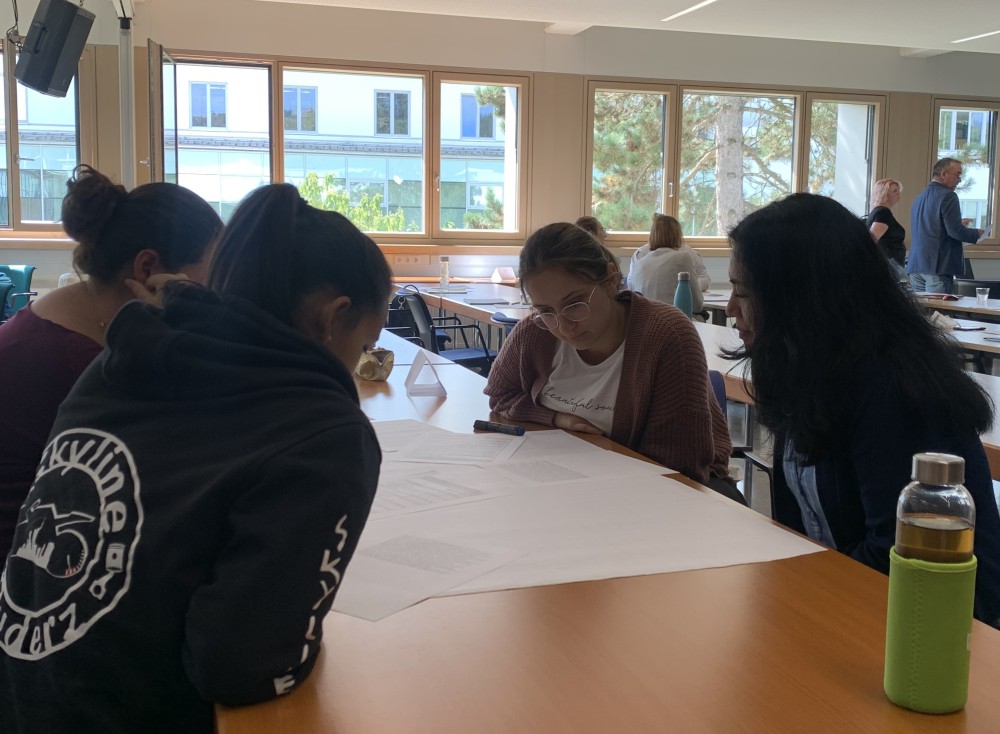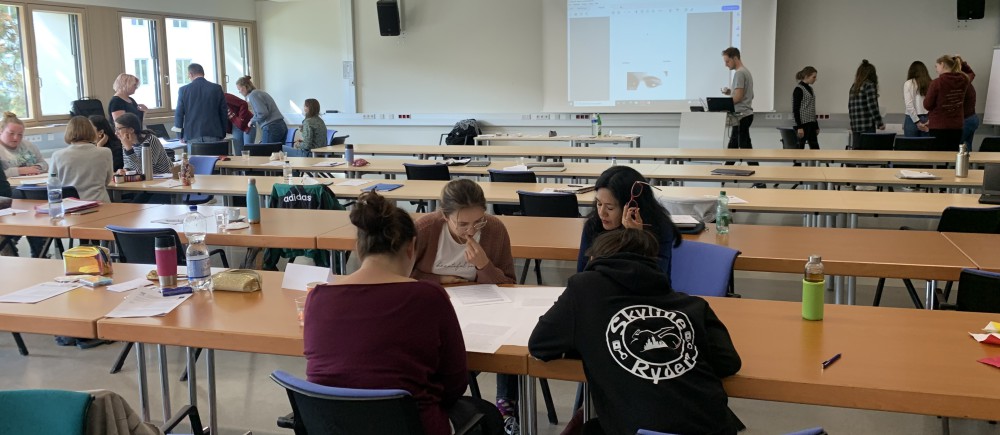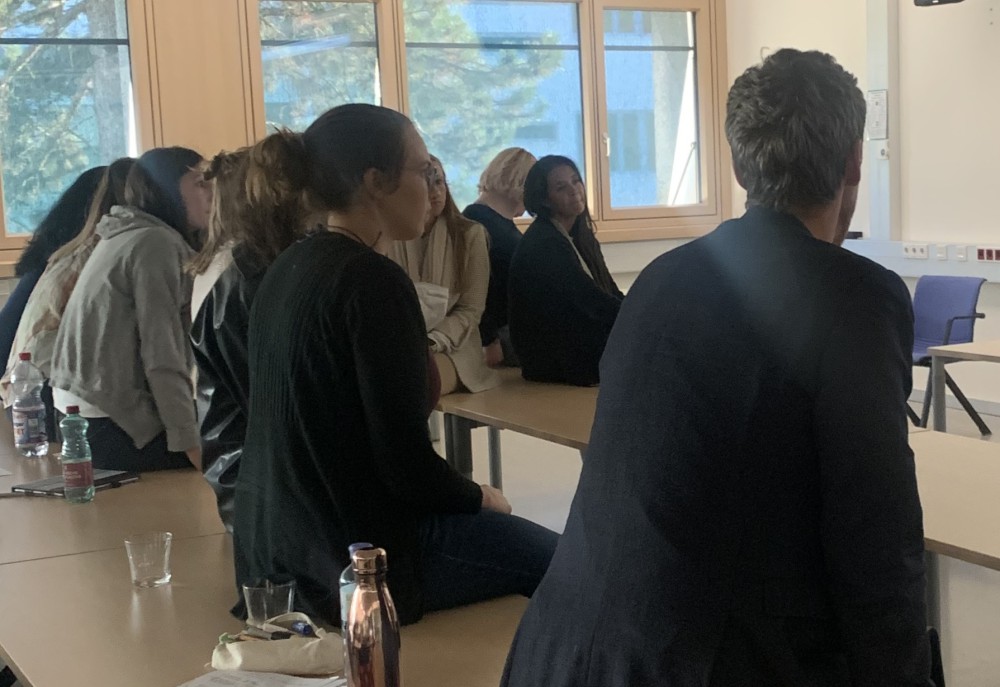Mentalization training
Below you will find information and teaching materials on the several modules, as well as first results on evaluation, assessment and further development for practice (revised and summarised as Results 2).
You will also find teaching materials for the modules 1-5 in Dutch.
Overview:
I) Kick-off event: Theoretical foundations
Module 1: Basics of the mentalization approach
Module 2: Assessing non-effective mentalizing and stress
Module 3: Fostering mentalization in and with groups
Module 4: Mentalizing pedagogical stance
II) Continuous supervision/case work in regionally organised groups
Module 5: Mentalization based interventions and toolbox
Module 6: Case-related self-reflection
III) Final workshop September 2021, University of Klagenfurt
Module 7: Organisational reflection
Module 8: Learning process support and evaluation
Module 9: Science and research results
Are you interested or do you have questions or suggestions?
Contact us via contact form or by e-mail at info@mented.eu.
Intellectual output 1
Module 1: Basics of the mentalization approach

Module 1: Basics of the mentalizing approach is divided into four parts and aims to introduce the history and theoretical foundations of the mentalizing approach as well as the development of the ability to mentalize and forms of mentalizing. In addition to the theoretical inputs, reflection exercises for groups or individuals are offered.
- Part 1: Introduction
- Part 2: Theoretical foundations of the mentalization approach
- Part 3: Terminology and lines of development
- Part 4: Forms of mentalizing
learning materials (english and dutch)
Module 2: Assessing non-effective mentalizing and stress

Recognising non-effective mentalizing and stress addresses the following four topics: First, it is shown how mentalizing and being mentalized - via specific communication signals and epistemic trust - facilitates or makes social learning possible. In the following step, the characteristics of effective mentalizing are considered and how non-effective mentalizing differs from it. Subsequently, we will work out how interpersonal stress and the resulting activation of the attachment system can lead to a breakdown of the mentalizing ability. Finally, it will be shown how it is possible to recognise so-called non-mentalizing modes in oneself and others.
Learning materials (english and dutch)
Module 3: Fostering mentalization in and with groups

We move and live in groups all our lives and groups are very supportive of mentalization. The following learning objectives should be achieved in this module: The participants know the most important basics of group theory. They know what a group is and which dynamics it can be charaterised by, or which factors are connected to group dynamics. The participants know the special importance of groups in pedagogy. The participants learn about the general context. This is refined in an attempt to adapt the tripartite communication system from psychotherapy to pedagogy according to Fonagy et al. (2017). Finally, the participants learn to transfer important principles of mentalizing work with groups to pedagogical groups.
learning materials (english and dutch)
Module 4: Mentalizing pedagogical stance

In Module 4 pedagogical basics of a mentalizing stance are presented and linked to results of psychotherapy research. These show that the working relationship between professionals, e.g. teachers/educators and learners plays a central role in the success of educational, social work and early years developmental tasks. Core aspects such as empathic interest and a not-knowing stance are elaborated as well as characteristics of a mentalizing attitude (e.g. support in attention and affect regulation).
learning materials (english and dutch)
Module 5: Toolbox
After the theoretical basics and the mentalizing pedagogical stance have been presented, examples from practice for practice are to be worked out. Participants of the mentalizing training devised, collected, discussed and structured practical examples in small groups (see Toolbox - Mentalizing in Practice). The results were then tested in practice and revised in a multiplier training.
Mentalizing needs to be practised....
Kirsch, Brockmann & Taubner 2016, S. 86Toolbox - Mentalizing in practice (english and dutch)
Module 6 Case-related reflection
Reflective case discussions are important for the professionalisation of the practioners, these take place in small groups (10 participants) regionally and continuously. Goals: Promoting mentalizing, recognising stressfull situations and coping with them, arousal regulation and understanding instead of control or punishment
Downloads
Module 7 Implementaton of mentalization based pedagogy in organisations
Implementation: lessons learned the hard way (J. Hutsebaut)
The implementation of a mentalizing-based treatment for adolescents: a case study from an organizational, team and therapist perspectives is presented. The author proposes a new comprehensive heuristic model of treatment integrity, this includes organizational, team and therapist adherence to the treatment model of treatment integrity, e.g. change should be introduced as a way of helping and empowering teachers in some regards, starting from daily struggles they recognize
Downloads
Module 8 - Learning process support and evaluation
A comprehensive "mixed-methods" evaluation concept was developed for the evaluation of the mentalization training, which combines a quantitative evaluation with qualitative elements in a non-randomised pre-post intervention study. The aim was to determine different levels of effectiveness of the training. The following levels were investigated:
The aim was to determine different levels of effectiveness of the training.
The following levels were investigated:
Aspect 1: Feedback from participants:
Aspect 2: Results of the questionnaire evaluation (quantitative).
Aspect 3: Evaluations qualitative
Aspect 1: Feedback from participants:
In the last part of the training, extensive feedback was collected from the participants. For this purpose, information was not only collected on satisfaction with regard to the content taught, thematic relevance, didactic implementation and appropriateness of the scope of the teaching content, but also on the perception of participation in the curriculum in a very experiential way, such as the assessment of practical usefulness, but also on the self-efficacy experienced (e.g. "I had the feeling that I could contribute better in small groups" or: "I was surprised that I go into certain difficult situations in everyday working life with little openness"). These open-ended questions were intended to ensure that the feedback covered relevant aspects of the participants. Examples of this (as well as some answers) were:
Which content helped you the most to establish aspects of practice?
- Answers (selection):
"Above all the detailed reflection phases and the film analyses, because these also sharpened my eye for the subtle processes between people or within a group."
"Overall, the attitude of the team, which made mentalization tangible. And the case reflection work in small groups. That also transferred to the group."
Which formats were less helpful? Why?
- Answers (selection):
"Some discussions in the large group because there were too many people and not everyone got a chance to speak."
Were there any "aha" effects? If yes: which ones? What helped to create them?
-Answers (selection):
"I noticed 'aha' effects especially in the reflection rounds when it was about specific cases or events. These came mainly from the perspectives of other lecturers and students that one had not considered oneself."
"When the case study was discussed, I had an 'aha' effect. Reflecting, discussing, analysing together showed me how important it is to talk to others, because everyone has different ideas, has specific knowledge. I believe that when you think you are at an impasse, mentalizing together is the key."
What do I take away for my (future) practice?
-Answers (selection):
"I take away how important individual perception is towards students. Also, that attention and trust are important foundations for mentalizing and that emotions are very important for action. I also find it very helpful to take away the factor of time and calmness, which serves as a basis for mentalizing conversations. The tool box-group task with the two task focuses was very helpful, as it was mainly about the application of mentalizing in practice."
Did you learn anything new about yourself during the course?
-Answers (selection):
"That I already think about the feelings and motivations of others in many situations, especially with children and young people or in private relationships (partnerships and family). First, that this is also very important in relation to colleagues at work and second, that I also think more often about how I am doing and how I feel."
Furthermore, the increase in competence and knowledge was evaluated, suggestions for improvement were developed (e.g. reduction of the number of slides on theoretical basics) and implemented (see revised slides).
Aspect 2: Results of the questionnaire evaluation
The following constructs were collected by means of questionnaires and their changes were measured in a group of N=38 (mean age: 25.7 years, mean previous professional experience: 0.64 years, 15% had experience with supervision work): Mentalizing (RFQ, ACS, MZQ, Teacher RFQ), Epistemic Trust and Distrust (ETMCQ), Symptomatic Stress Level (SCL), Personality Functioning Level (LPFS-BF).
Initial results showed significant changes with small and medium effect sizes in the desired directions:
- Improvement in mentalizing ability (Teacher RFQ, ACS, MZQ: Self-reflection, MZQ: Emotional awareness, reduction in MZQ: Psychic equivalence mode and increase in MZQ: Regulation of affect).
- Epistemic confidence: Increase in epistemic trust (EV: Trust scale) and decrease in epistemic distrust (EV: Mistrust scale).
- Psychopathology and symptomatology: reduction in depressiveness (SCL: depressive scale) and agoraphobic anxiety (SCL: agoraphobic scale), improvement in personality functioning (reduction in LPFS-BF: total, LPFS-BF: Self-functioning).
These results are promising regarding the effect of the training, but need to be verified in larger samples and with control groups and follow-up surveys.
In a next step, these changes will be compared with a control group that only participated in the theory part of the training but not in the reflective group work and face-to-face sessions.
In a separate file (downloads) you will find the detailed results of the questionnaire evaluation on mentalization training.
Downloads
Aspect 3: Evaluation qualitative
Evaluation film
With the help of third-party funding, a separate evaluation film was produced ("Das Elterngespräch") and piloted as a first (experimental) mentalization measurement for the pedagogical field. This film is currently being empirically validated in follow-up studies with regard to its psychometric quality criteria. However, the instrument itself has already aroused interest among other research groups who will use it.
Also in the pre-post design, other self-developed instruments were used e.g. a case vignette and narrative-based assessment of the complexity and changes in mentalizing ability. Case vignettes were reflected upon by the participants. These are currently being evaluated.
Example vignette 1:
It is quite noisy in teacher Anne Kaiser's preschool class. Sarah has got her finger stuck in the door and is crying loudly and unmistakably. Anne looks after Sarah. She has fetched a cool bag from the staff room to ease the pain and comforts Sarah. However, chaos has broken out in the rest of the class. David climbs onto the table and jumps as far as he can into the middle of the room, which looks dangerous. Some others follow his example. Then David starts an imaginary sword fight with Stephan. Emma is standing right next to Anne. She strokes Sarah's head and says encouraging words to her. When Sarah stops crying, she is hugged by Emma, who says to her: "Come with me, I'll stay with you and we'll play something quietly. She makes a funny face, whereupon Sarah starts to smile a little again.
Describe what you think is going on here and how you would behave in this situation. How would you deal with Sarah, David and Emma in such a situation?
The Master's thesis by Christina Bayer (PH-Ludwigsburg/Prof. Gingelmaier) focuses on the mentalization skills of educational professionals who participated in mentalization training. The participants completed a written interview before and after the training. These interview transcripts are currently being compared with each other. First results indicate that the mentalization training has a beneficial influence on the mentalization ability of the educational professionals.
Another Master's thesis by Alisa Flattich (PH-Ludwigsburg/ Prof. Gingelmaier) is dedicated to the question of the extent to which an effect of mentalization training can be proven. Students participated either exclusively in the theoretical module of the curriculum (control group) or additionally in supervision sessions as well as a five-day compact training in Klagenfurt (study group). Data were collected in writing within the framework of an open questionnaire at two points in time. The answers are coded according to the guidelines of the RFS (Fonagy et al. 1998). It is expected that among the students who participated in all elements of the training, an increase in mentalizing ability can be mapped over the two measurement points, while among the group that only completed the theoretical module, no changes can be mapped. The still outstanding statistical results will have to be discussed against the background of the relatively small sample (38 participants) as well as possible fatigue effects with regard to the second survey time point. The work provides approaches for further data analyses, for example, with regard to the development tendencies of an "attitude of ignorance" that can be assessed as mentalizing.
Intellectual output 2
In an advanced seminar in Klagenfurt in April 2022 (train the trainer), the competences were deepened, the teaching contents developed so far were reflected on with the help of the evaluation results and practical experience, and possibilities and ways of implementation in organisations were worked out.
As important results (Results 2), the slides for modules 1-4 were revised and shortened (see above), tips for maintaining one's own mentalization skills and for leading mentalization-based case reflection in groups were compiled and suggestions for a sustainable implementation of the mentalization approach in organisations were developed. Together this results in a first counselling guide for practice.
Manual for a multiplier training
Based on the Curriculum Mentalization Training, the teaching of theoretical basics, case-related work (in total approx. 90 teaching units), a multiplier workshop (approx. 33 teaching units) is proposed for participants who are interested and have practical experience.
The aim of this multiplier workshop is to train participants so that they can independently conduct further training in organisations in which they themselves work.
Manual
Counselling Guide
Mentalization based case reflection
Mentalization based case reflection
On the (sustainable) implementation of a mentalization based concept (M. Henter)
The author presented different implementation phases of mentalization training and formulated an implementation plan. On the (sustainable) implementation of a mentalization-based concept - or: what happens after mentalization training for educational professionals?

